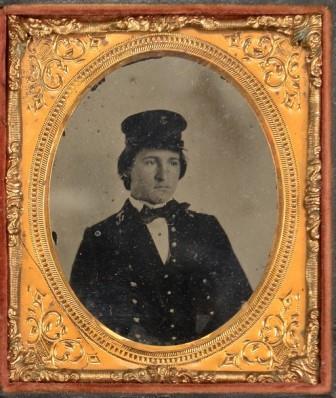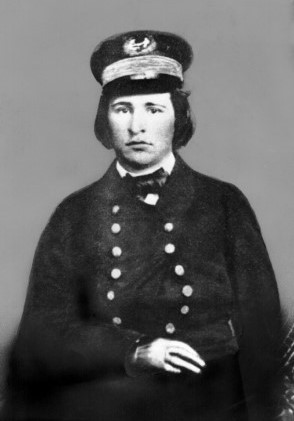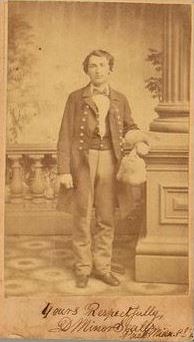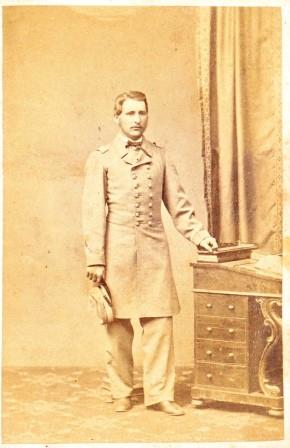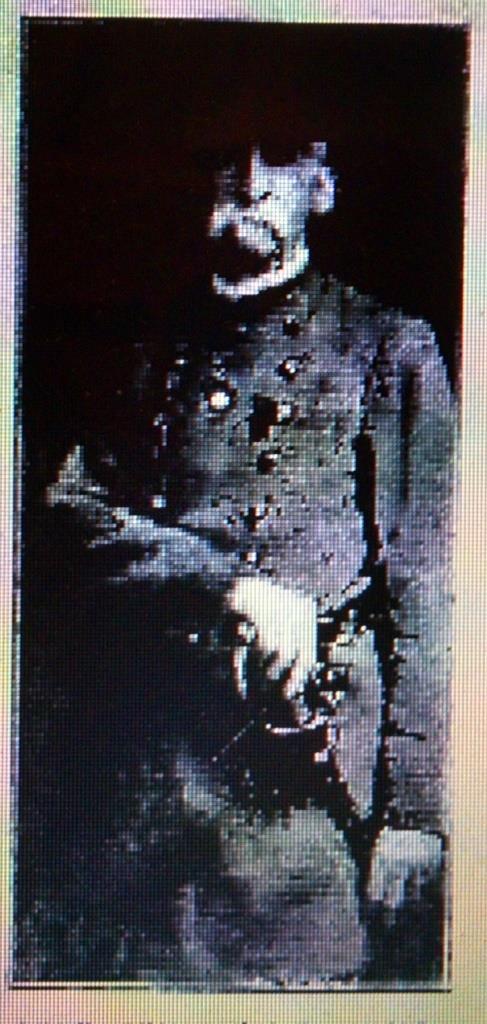|
|
|||||||||||
|
15 Scales, Dabney Minor |
|||||||||||
|
ORN I-23, pg 698 (1 Jun 1841, nr Holly Springs, Miss. - 26 May 1920, Wyoming, where his son lived) An article in the Confederate Veteran reads, "Believing, as our forefathers did and as the truth taught us, that the United States was created as an association of sovereign States and that the first duty of every citizen was to the sovereign State in which he was born, he unhesitatingly accepted the call to duty from his State and took his place in the ranks of her sons." He was assigned to the western waters, the Mississippi, to keep the river open for traffic. Here, he was "a lieutenant on the gunboat Arkansas, a vessel especially constructed for this service, and won applause and public recognition for conspicuous courage in restoring to its place the flag of his vessel, which had been cut down by a shot from the enemy, an act which required him to pass over the exposed deck during the hottest fire of the engagement." (Confederate Veteran, Vol. XXIV, pg. 431)
Letters from Scales exist in different libraries. Four photostats of letters, including the one farther below (coming), are housed in the Memphis Public Library and Information Center.
In the last years of the war, Scales went to Europe to arrange for the outfitting and manning of vessels built in England for the Confederacy and was eventually assigned second in command of the ship Shenandoah, built for merchant raiding in the Atlantic and Pacific. Scales and the Arkansas' John Grimball would be two of the Shenandoah's four lieutenants. The ship was successful in damaging the merchant shipping of the Union and depriving it of ships. Late in hearing the news of war's end, the Shenandoah surrendered in England in Nov 1865. Tom Chaffin is the author of Sea of Gray--the Around-the-World Odyssey of the Confederate Raider Shenandoah. On pgs. 356-357, he writes, "During her thirteen-month cruise, the Shenandoah covered 58,000 miles and be came the only Confederate ship to circum-navigate the globe. She had destroyed 32 vessels, ransomed 6 others and taken 1,053 prisoners. In all, the value of the vessels and cargoes destroyed by the raider, according to her officers' calculations, came to $1.4 million. Moreover, Waddell later boasted, 'The last gun in defense of the South was fired from her deck.'" She flew the Stainless Banner, the second national flag of the Confederacy.
The Obituary of Dabney Minor Scales, Memphis, Tennessee
Dabney Minor Scales was born on June 1, 1841, near Holly Springs, Miss. His father was a typical Southern planter and gentleman of the family which settled in colonial days in Virginia and North Carolina. He was appointed to Annapolis and was in his last year and ready for service in the navy at the outbreak of the war between the North and South.
Believing, as our forefathers did and as the truth taught us, the the United States was created as an association of sovereign States and that the first duty of every citizen was to the sovereign State in which he was born, he unhesitatingly accepted the call of duty from his State and took his place in the ranks of her sons.
His first assignment was upon the Mississippi River, opposing the naval forces of the United States in the effort to close the navigation of that water, and here he found service in line with his training, holding back ships from the Gulf and gunboats from the North.
He was a lieutenant on the gunboat Arkansas, a vessel especially constructed for this service, and won applause and public recognition for conspicuous courage in restoring to its place the flag of his vessel, which had been cut down by a shot from the enemy, an act which required him to pass over the exposed deck during the hottest fire of the engagement.
After the surrender of Vicksburg, Lieutenant Scales saw service on the Atlantic between the coast line of the Carolinas, Georgia, Florida, and the West Indies in protecting blockade runners, obstructing enemy shipping, and inflicting heavy losses wherever possible. During the last years of the conflict, in company with others of his class from the Southern States, he was stationed in Europe and spent much time in London and Paris upon service of the Confederate government incident to outfitting and manning vessels constructed in England for the Confederacy. This service was terminated with an assignment as second in command of the Shenandoah, which sailed as a cruiser in Atlantic and Pacific waters during the last year and even after the close of the conflict, for it was many months after the surrender at Appomattox before by the capture of a small vessel the officers and crew of the Shenandoah learned that the Confederate government had ceased to exist. Sailing by the Cape Horn to avoid capture, this last armed foe of the United States found her way to Liverpool, and her officers and crew disbanded, and each in his own way sought his home port. For reasons of prudence not necessary to mention Lieutenant Commander Scales considered ot best to seek a new home and country and did not return to his former allegiance, but, in common with others of the Southern cause, went to Mexico and spent several months to try out the land. Finding this experience unsatisfying and political conditions of his State somewhat more promising, he returned to the home of his boyhood, and in a few months more established himself in Memphis and began the practice of law in the office of Kortrecht and Craft about the year 1869.
[The record above was written by his office associate, William W. Goodwin.]
Scales was married in Nashville to Mrs. W. D. Powell [Susan Black Winchester], a daughter of the late Maj. George W. Winchester, by which union there were three children: Dabney M. Jr., who died; George W. Scales, now living in Wyoming; and a daughter, now Mrs. Yates Wellford, of Memphis.
During the administration of Gov. Peter Turney he was elected a member of the Tennessee Legislature and served with his usual faithfulness in the Senate.
At the outbreak of the Spanish-American War he offered his services to the United States government, which were accepted. He was commissioned a lieutenant in the navy and engaged in actual sea service during the entire war, after which he received his honorable discharge.
He became a member of the Memphis Confederate Historical Association on March 12, 1884, and continued a valuable member until his death. He was honored with the presidency of the Association, and consequently was Commander of Camp 28, U. C. V., and Bivouac No. 18, Tennessee Soldiers' Association.
He was one of the original members of Company A and took part in its famous competitive drill against the Chickasaw Guards in 1894. Afterwards he was elected a lieutenant of the company and then captain, which position he held until his death. He was a devout Christian gentleman and a lifelong member of the Episcopal Church. As a citizen he was always in the forefront of any movement looking toward the benefit of his city, his State, and his country. As a man he was singularly sincere and just and conscientious; his manner was gentle , but in principle he was firm as a rock. In his death, on May 26, 1920, his comrades have lost a friend and companion, his family a devoted father, and the city and State a valuable citizen, too few of whose type now remain. [Committee: Edward Bourne, Chairman; M. V. Crump, C. A. DeSassure, W. A. Collier.] From the Confederate Veteran Magazine, November 1920. ------ According to findagrave.com (Memorial # 96947796), Dabney Minor Scales was buried in Elmwood Cemetery, Memphis, Tenn.
|
|||||||||||
|
Use back button to return.
|
|||||||||||
|
|
|||||||||||
|
|
|||||||||||
